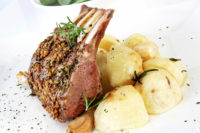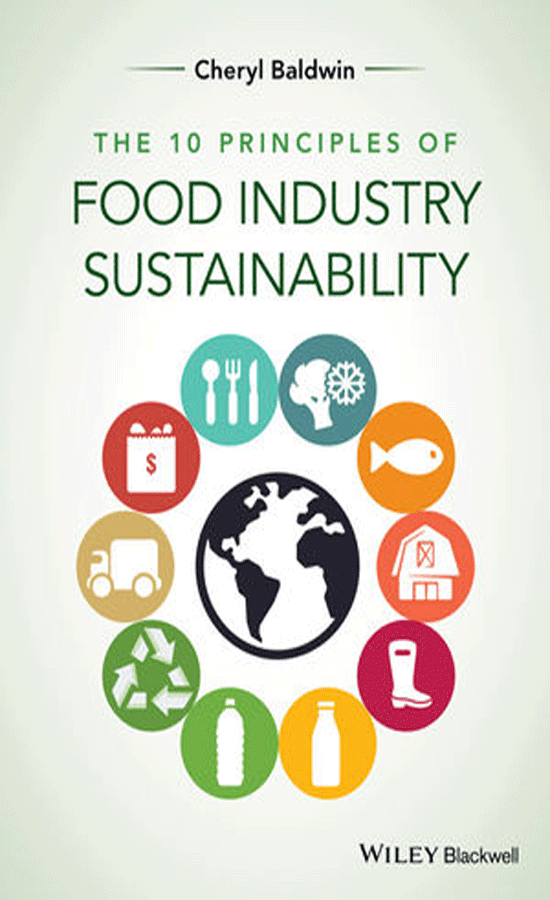Through natural growth and acquisitions, Superior Farms has become one of the dominant names in the lamb industry. The company employs more than 400 people nationwide, with its headquarters in Dixon, Calif., and its largest plant in nearby Davis. It also has facilities in Vernon, Calif., Boston, Chicago, Denver and Hawarden, Iowa.
For most of the company’s existence, it has been a packer, distributing cuts to retail stores, butchers and restaurants nationwide. Only in the last couple of years has it expanded its reach by successfully entering the retail market with packaged, case-ready products.
Growth in a shrinking sector
Prior to CEO Ed Jenks’ joining the company in July 2010, he worked for seven years as an independent consultant with the company’s longtime chairman and CEO, Les Oesterreich, who retired this June. That experience made him very familiar with the company, he says, but he is still trying to understand how the lamb sector as a whole works. Nonetheless, he has some suggestions.
“We have got to begin to apply more good business science to the industry if we’re going to survive,” he says. “That means … really understanding things like supply-chain economics.”
Jenks says that the company made several strategic moves in 2010, incorporating more science and data into the business.
“You can’t run a business just on numbers, but running it without numbers is really bad,” he says. “We’re finding a happy medium between using good numbers and good common sense.”
Jenks points out that the supply chain for the lamb sector has been decreasing by about 3 percent a year. The Midwest in particular has seen a shortage of lambs, because more and more farmers are taking advantage of the high prices for feed and are growing corn instead of raising lambs. Superior Farms was forced to temporarily close its Iowa plant this May because of the lack of supply. Jenks notes that there are only three sizable slaughterhouses for lamb in the country — Superior Farms’ Denver and Dixon facilities and a JBS Swift plant in Greeley, Colo.
“To me, now that the ewe/lamb numbers have dropped to where they are today, it absolutely shocks me that industry professionals are still calling lamb a commodity product,” Jenks says. “It’s a specialty product — there’s no way around it.”
Superior decided that the company couldn’t succeed by charging a commodity price for a specialty market, and at the same time, it began an aggressive marketing push to gain market share. The result was that the company bought more lambs than it previously ever had, and with the supplies being short, the end result was that the price of lamb increased.
Jenks acknowledges that the price can only go so high before consumers push back, but the company’s efforts have paid off. Superior’s sales have grown 30 percent this year.
“It’s a result of the marketing that the industry is doing through [USDA’s Agricultural Marketing Service] and what large companies like us are doing,” he says. “We’re spending a large amount of money on marketing, we’re bringing the consumption rate up, and the price is going with it. The consumer ultimately dictates the market,” Jenks adds. “Will it come down a little? Yes, because consumers will push back and not pay the price. But I don’t see this market is going to come crashing down anytime soon.”
In order to acquire all the lambs it needed, Superior paid more for its lambs and expanded its contract program with producers.
“It’s good for them, it’s good for us,” Jenks explains. “We know what that supply is going to cost us, so we can price it accordingly. We know how many lambs we’re going to have, so we know how much we can grow our market share. Watching that supply chain is very important.”
Although lamb has been a consistent seller to the foodservice industry, gaining a larger foothold at retail has been a challenge. It is, however, catching on with younger “foodies” looking to expand their culinary horizons with some assistance. Angela Gentry, marketing director for
Superior Farms, points to research indicating people wanted to try lamb but were afraid of trying to prepare it themselves.
“About 40 percent of people haven’t tried lamb at all,” she notes. “That’s a huge number of people who haven’t tried it because of the intimidation factor. We try to make it as easy as possible.”
Superior Farms has added several new products designed to make lamb preparation easier for consumers. Earlier last year, the company introduced a cook-in-bag leg of lamb, which created a fool-proof way to prepare a pre-seasoned 5-pound leg. The company has recently unveiled a Mediterranean Grill line that includes Greek-inspired lamb and beef tips, gyro slices and lamb sausage.
The rationale behind the products is simple, and it has proven to be effective. Consumers pick up a product such as ground lamb or sausage, and they know how to prepare it based on similar products made of pork, beef or poultry. Once they discover they like the taste of lamb and are able to prepare it, they will be more inclined to try a higher-end cut in the future.
Superior Farms has given itself a goal to introduce two new products per year. Along with the Mediterranean Grill products, a line of lamb-centric comfort foods is coming to the marketplace soon. Jenks notes proudly that the company has been leading the industry in new product innovation.
“People think it’s hard to cook lamb, when it’s no more difficult than anything else. But to season it appropriately, that’s something we’re experts at,” he adds. “We’ve created a lot of seasonings and a lot of different looks to our products, and they’ve been very well-received.”
Superior Farms’ goal is to reopen its Iowa facility, which would require from 4,000 to 5,000 animals a week. Jenks says that the growers are working on a “2 + 2” program, which involves them holding two animals back for every 100 sold, and increasing the flock’s birthing percentage by 2 percent. His hope is that the program will grow the nation’s lamb herd enough to sustain an additional slaughterhouse and processing plant.
Cutting edgeprocessing
At 70,000 square feet, Superior Farms’ Dixon facility is the largest of the company’s plants in terms of size, though its Greeley facility processes 2,000 animals per day to Dixon’s 1,400. Along with the sheep, the plants also process some goats and do some portion cutting of beef and pork. Because both facilities are certified Halal, the pork processing is completely segregated from the rest of the work.
The lambs themselves come to Dixon from an approximate 300-mile radius. During the early months of the year, the company may also bring them in from the Imperial Valley area in Arizona and southern California. One of the plant’s largest lamb suppliers is Emigh Lamb, also located in Dixon. Martin Emigh is a fourth-generation rancher with 1,000 acres of land. His flocks feed off of the native California grasses and plants, including rye grass, foxtail, milkweed and clover.
A typical packer-producer relationship can be considered contentious at best, and Emigh notes that many producers see a big curtain between themselves and the country’s packers. His relationship with Superior Farms is quite different, though.
“This is a friendly relationship and a positive relationship, and if I have a question, I don’t feel apprehensive to ask it and share ideas,” he says. “Look who’s signing your checks. I want to be their friend, because they’re buying my lambs. I want to do as good a job as I can, so I want to talk to someone on the fab floor about what’s the best lamb.”
Superior Farms is an employee-owned business, making the employees shareholders as well. Shane MacKenzie, vice president operations, calls himself the new guy, as he’s only been with the company since 1997.
“The majority of people here are 15 years or longer,” he says. “If you go onto the slaughter floor, I bet it’s closer to 20 years. The turnover is minimal.”
The ESOP (Employee Share Option Plan) also gives employees the extra incentive to make sure things are done the right way in the facility. As a result, end products are made right the first time, and the company’s workers’ compensation rates are much lower than the rest of the industry.
In order to help its retail customers get the most flexibility and shelf life, the facility has a sophisticated packaging department. Lamb cuts can be gas-flushed or placed in a sealed tray. For the most shelf life, they can opt for vacuum skin packaging, or VSP.
“One of our biggest competitors in the grocery store for lamb is the garbage bin. If it doesn’t sell in three to five days, it ends up getting tossed out,” MacKenzie says. “This [VSP] allows our users at the retail level longer shelf life, and this has allowed their shrink to decrease by about 70 percent.”
Jenks adds that major retailers are jumping on board with VSP, including some that are converting their entire veal and lamb section over to the packaging. The drawback to the packaging, though, is the significant cost of the equipment, and the lag between ordering a packaging machine and having it installed.
“We almost always have one on order,” Jenks notes. “We’re expanding our East Coast operations significantly, and the retailers on the Eastern seaboard are flocking to the concept and making a lot of commitments to us.”
“Sustainability” is an important word when it comes to Superior Farms’ processing abilities. The company takes great pains to create as little waste as possible, while recycling or reusing everything that it can. The company co-owns a nearby rendering plant and uses it to help utilize every part of the lamb carcass. MacKenzie says that the offal is in high demand. The organs are popular with some ethnic communities, including Muslim and Hispanic consumers. The bones and hooves can be used as pet treats. The intestines are used to produce sausage casing. The heads can be stripped of all edible parts, and the remainder, including the eyes, brain and skull, can be used as teaching aides.
The hides, once removed and treated, become an additional profit source. The hides are salted, dried and shipped overseas, where they are made into rugs, paint rollers, boots and more. The water that drips off the hides is collected and sold to a third party. After being run through a centrifuge, the lanolin oil from the liquid is sold to the cosmetics industry, while the salt is sold to the Nevada roadworks.
The facility is located outside of the Dixon city limits, so the company is responsible for bringing in its own water. It has an extensive water treatment area located just outside the plant,
“You can’t have waste in lamb; that’s where you make your money,” MacKenzie says. “Hopefully, the sales guys can make the processing room break even, and all the little extra things are profit.”










